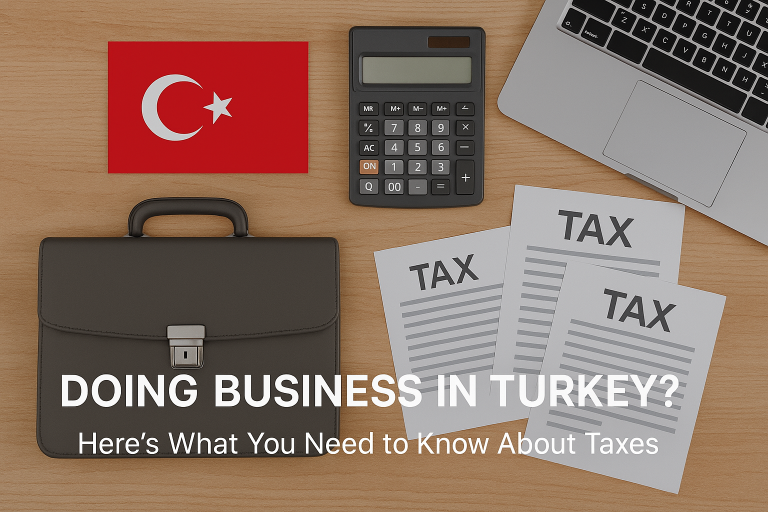Looking beyond the tourist-brochure associations that the very mention of Turkey might conjure up in some people’s minds – such as its enchanting beaches and captivating historical sites – this state spanning Southeast Europe and West Asia also presents many interesting entrepreneurial opportunities.
Officially the Republic of Türkiye, Turkey is distinguished from a business perspective by its strategic location bridging Europe, Asia, and the Middle East. Furthermore, it is home to a young and skilled workforce, and its economy has seen steady growth in recent years.
If, however, you’re considering establishing your own corporate presence in Turkey, you might be interested in knowing more about some of the taxes to which you may be subject. So, below, we have set out a few of the most important levies to know about.
Before we go any further… what are the essentials of the Turkish tax system?
There are various categories of taxpayers in Turkey. So, you will need to understand the pertinent rules if you are looking to establish a new business in this part of Anatolia, or if you are interested in expanding the presence of your existing overseas organization into Turkey.
Such factors as residency status, and the nature and scope of taxable income, dictate the categorization of taxpayers in this area of the world.
Focusing specifically on corporate entities rather than individuals, let’s explain the different types of taxpayers:
- Full taxpayer status: a given company will be regarded as resident in Turey for tax purposes if the country is where its legal headquarters are situated, or if the country is its place of effective management. Resident corporations in Turkey are taxed on their worldwide income. This status as a full taxpayer applies to the majority of organizations, companies, and institutions in Turkey.
- Narrow taxpayer status: alternatively, if a particular company is not considered resident in Turkey for tax purposes – its legal headquarters and administrative center being located outside the country’s borders – it will only be taxed on its income earned from Turkish sources.
4 taxes that you may need to know about as a businessperson in Turkey
With no further ado, it’s time to put a spotlight on four tax categories that apply to various businesses, organizations, and institutions in this fascinating country:
- Income tax
Both individuals and entities within Turkey can expect income tax to be levied on the income they earn. For most Turkish companies, the current corporate income tax rate is 25%; however, incentives and exemptions are in place for certain sectors.
Such resident entities in Turkey as corporations, funds, and cooperatives are taxed on their worldwide income. Meanwhile, non-resident entities are taxed purely on income earned within the country through permanent establishments or agents.
- Value-added tax (VAT)
One of the major indirect taxes that both businesses and individuals in Turkey need to be aware of is VAT, which is applied to the sale of goods and services.
The most common VAT rate – applicable to the majority of goods and services in the country – is 20%. However, lower rates apply in some cases – for example, 10% on the likes of pharmaceutical items and clothing products.
VAT in Turkey is reported and paid on a monthly basis. The country’s businesses are entitled to claim VAT refunds on their input taxes for goods and services purchased.
- Tourism tax
Also referred to as the “accommodation tax”, this relatively recently introduced levy was introduced as a means of bringing in greater revenue from Turkey’s thriving tourism industry.
The proceeds are meant to support the sector’s development and the maintenance of public services connected with tourism.
Technically, it is guests staying at Turkish hotels, hostels, resorts, and other forms of accommodation in the country that are obliged to pay this tax; however, it is the establishment that usually collects it.
The presently applicable rate of tourism tax in the country is 2% of the accommodation cost, excluding VAT.
- Banking and insurance transaction tax (BITT)
Transactions performed by Turkish banks and insurance companies are subject to BITT, at rates ranging from 1% to 5%. In the case of most transactions and services, it is the highest rate that applies.
If you’re ready to discover the Aspirock solutions that can support your organization in Turkey – including ensuring compliance with local employment regulations and the payment of relevant taxes – please don’t hesitate to contact us today.
